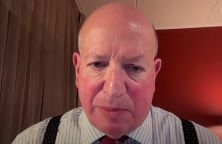The potential coalition agreement in the state of Brandenburg between Scholz’s Social Democratic Party (SPD) and the pro-Russian Left Alliance led by Sahra Wagenknecht has sparked intense debate.
According to Reuters, the agreement’s language could undermine the federal consensus on supporting Ukraine in the war.
This week, Brandenburg’s SPD endorsed a joint statement with the Alliance of Sahra Wagenknecht (ASW), which included a controversial line: “The war cannot be ended by sending more weapons.” Both parties also committed to working toward a diplomatic solution to the “Ukrainian conflict” and criticized the deployment of medium-range and hypersonic missiles in Germany.
These statements have provoked backlash across German political circles, even within some members of the SPD at the federal level.
Agnieszka Brugger, a Green Party MP within Scholz’s coalition, accused the SPD of enabling ASW’s “cynical and populist agenda.” “Those who speak of peace but mean ending support for Ukraine do not want real peace,” she told the media, adding that this policy would endanger Germany’s and its allies’ security.
SPD foreign policy expert Michael Roth noted that the document deviates in several ways from the stance of Chancellor Scholz and the SPD. Munich Mayor Dieter Reiter, also from the SPD, called the language used by the Brandenburg SPD “unacceptable.”
The opposition CDU/CSU alliance sharply criticized the SPD-ASW compromise. Die Zeit reported CDU faction leader in Brandenburg Jan Redmann’s comments that the document signals the SPD’s willingness to abandon its foreign policy principles just to align with Wagenknecht.
Meanwhile, Brandenburg’s SPD members received an email, reported by DPA, clarifying that the SPD and ASW do not share the same views on Ukraine across all issues, and this won’t change at the federal state level.
Brandenburg SPD Secretary-General David Kolesnik explained that it wasn’t necessary to explicitly affirm support for arms deliveries to Ukraine in the joint document because it was a compromise. However, he stressed that the SPD does not oppose supplying Ukraine with weapons, as they are essential for Ukraine’s self-defense, even though weapons alone won’t end the war.
In Brandenburg’s state elections, ASW secured 13.5% of the vote. Although the SPD won, they chose to ally with Wagenknecht’s far-left party rather than the far-right Alternative for Germany (AfD). Known for her pro-Russia stance, Wagenknecht insisted on including clauses about a diplomatic resolution to the war in Ukraine and rejecting American missile deployments in Germany. Otherwise, she would not support forming the coalition.
Read also: Olaf Sholz And His Party “Betrayed Ukraine”. Interview with Serhii Sumlenny













